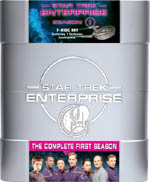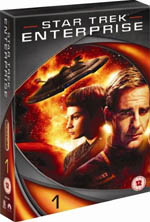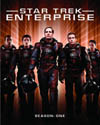03: Fight or Flight
At first glance, this mostly looks like a pretty decent episode, though not an outstanding one.
However, as season one continues and perspectives shift towards hindsight, this is actually one
of the better episodes of the first season. It is focused more on Hoshi than on
anyone else, and provides one of the best windows into her character that she will ever get
on the show.
Hoshi's language talents are showcased in this episode, and the situation of the day
certainly piles on some challenges in that arena. This seemed an interesting thing to do
in this episode, but a logical extension of the premise of "Star Trek: Enterprise" could
easily dictate most of these same difficulties would arise each time they contact a new
species, which would be often since almost everyone was new at this stage. Could the language
barrier remain interesting if this challenge was repeated each time? How many more episodes
could make use of this? If only a few, was it ever a good idea to start with it? And what kind
of cheats might the show pull from its more established future to circumvent this?
Thankfully, the challenge is a success this early in the show, and largely because
Hoshi's real challenge here is with her confidence, and with her ability to adjust to the
new lifestyle she has opted for on board Enterprise NX-01. There's a nice metaphor in this
story with a slug-like specimen picked up from a passing world, now transplanted to an
environment that "she" isn't well-suited for. Hoshi finds it easier to talk about
the slug's predicament instead of her own, although the mirroring of the two is quite obvious
to both the audience and her shipmates. It's a nice device for the episode on its own merits,
while also setting off a bit of a red flag on the biological contamination aspects
of the Prime Directive, which further highlights the fact that Starfleet hasn't really
thought of the Prime Directive yet.
As with
"The Galileo Seven" in original Star Trek's first year,
our sole Vulcan character becomes the story's only vocal advocate for respectful non-involvement,
while everyone else (Earthlings & Phloxling) would rather jump in with both feet.
This story has a better sense of knowing where it's going with this issue than
"The Galileo Seven", which is to be expected, but it's also interesting to note how much of what will
become standard Prime Directive philosophy is here presented to be largely a Vulcan concept.
That code of conduct is not, however, complete in being an ideal for Humans. Archer has a
nice moment near the end where he remembers to add our code of conduct to the mix, and get
a better outcome. Nice.
The story has an action climax that feels a bit imposed onto the story merely to provide
energy and excitement. It works in part by also bringing a side-plot with Malcolm Reed to a
satisfactory resolution, but what is being sidestepped here are extended negotiations to find
solutions that might suit all the parties involved. As it stands, we learn precious little about
the tale's true antagonists, who have no voice in this piece at all. And so perhaps
Enterprise's actions went a bit too far in this case.
But in the end, this is an interesting story that couldn't really be told quite like this
at any other point in Star Trek history, because Trek will move on and develop rather quickly.
With such hindsight in mind, the uniqueness of "Fight or Flight" is something to be savoured
while it lasts.
Read the next In-depth Analysis Review:
"Unexpected"
|
|








 slimline
slimline U.S.
U.S. Canada
Canada U.K.
U.K.
